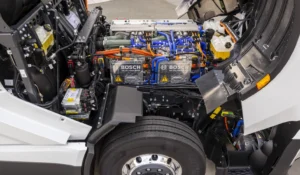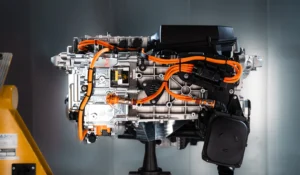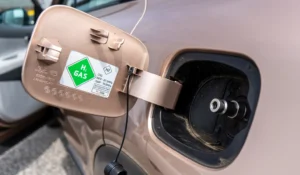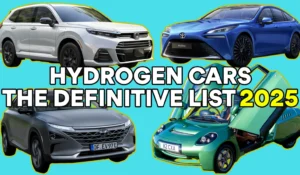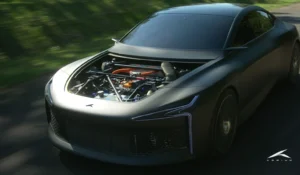EXCLUSIVE | Bosch UK boss: “UK & Europe must act on hydrogen or risk falling behind China and India”

The UK risks falling behind hydrogen frontrunners such as China and India unless it takes stronger, more coordinated action to support the sector.
That’s the message from Steffen Hoffmann, Managing Director of Bosch UK, who told Driving Hydrogen that government policy must urgently evolve to support both infrastructure and industrial capability.
“There is a risk that the UK and Europe will fall behind global frontrunners like China and India, who are already making significant strides in developing their hydrogen economies,” Hoffmann said.
In a wide-ranging interview, he outlined Bosch’s approach to hydrogen across production, infrastructure and mobility, and called for a more inclusive view of hydrogen technologies – including both fuel cells and hydrogen combustion engines.
Green hydrogen through electrolysis is “one of the most promising commercial opportunities”
Bosch is involved across the hydrogen value chain, but Hoffmann believes green hydrogen production is the most immediate commercial opportunity.
“One of the most promising commercial opportunities in the near term lies in green hydrogen production through electrolysis,” he said.
“With global capacity expected to reach up to 170 gigawatts by 2030, Bosch is drawing on its industrial manufacturing expertise to scale up production of its new Hybrion PEM electrolysis stacks, which are the central component of modern electrolyser systems.”
The new stack, launched at Hannover Messe, is already gaining traction.
“Unveiled at Hannover Messe, this development is a major step in advancing renewable hydrogen production, with Bosch already securing around 100 megawatts in orders and working closely with a network of partners across Europe to accelerate deployment.”
But realising hydrogen’s full potential will require more than just technology.
“Unlocking the full potential of hydrogen energy depends on overcoming some barriers. These include gaps in infrastructure and regulatory clarity.
“Although hydrogen is safe to produce, transport and use, lingering misconceptions might be holding back adoption.
“At the same time, underdeveloped policy frameworks and infrastructure create obstacles to scaling.
“Bosch is actively addressing these challenges by bringing together technical leadership, collaboration and public engagement.
“We are advancing cutting-edge hydrogen technologies while also helping to build the broad ecosystem required for hydrogen to reach its full potential as a key pillar of the global transition to net zero.
“There is now a clear need for the UK to reassess its infrastructure priorities”
Asked about the UK’s early hydrogen refuelling infrastructure – much of which centred on 700-bar refuelling for passenger vehicles – Hoffmann was direct in his assessment.
“The initial focus on 700-bar refuelling for passenger cars was a well-intentioned step, but it has not scaled as expected.
“As the hydrogen landscape continues to evolve, there is now a clear need for the UK to reassess its infrastructure priorities.”
He pointed to sectors where hydrogen has more immediate and pressing utility.
“The most immediate and impactful applications for hydrogen are emerging in sectors where electrification is less practical, such as heavy-duty transport, industrial processes and heating.”
And he laid out what the UK should prioritise next.
“To meet future energy needs and deliver on decarbonisation goals, the UK must prioritise infrastructure that supports freight corridors, commercial fleets and industrial clusters.
“Redirecting focus towards these high-impact areas, backed by clear policy frameworks and targeted investment, will accelerate hydrogen adoption and strengthen long-term energy resilience.”
Bosch is investing in both fuel cells and hydrogen engines
Rather than backing one drivetrain over the other, Bosch is investing in both fuel cells and hydrogen combustion engines – a decision Hoffmann says is based on their complementary strengths.
“Bosch sees both mobile fuel cells and hydrogen engines as key technologies in the shift towards a hydrogen-powered future, particularly in sectors where cutting carbon emissions is most challenging.
“Each solution offers distinct advantages, depending on the application, and together they form a complementary approach to decarbonising the UK’s industrial and transport sectors.”
He outlined where fuel cells are best suited:
“Fuel cells are especially well-suited for long-distance transport. They have reached the level of technological maturity required for widespread use, with Bosch starting volume production of its fuel cell stack in late 2022, followed by the fuel cell power module in July 2023.
“These systems are ideal for vehicles that operate over long distances and carry heavy loads.
“They offer short refuelling times, almost zero local emissions and a climate-neutral footprint when powered by renewable hydrogen.”
And contrasted that with hydrogen ICE:
“Hydrogen engines, on the other hand, present a strong opportunity in the short to medium term.
“They are almost carbon neutral and particularly effective in sectors such as freight, agriculture and construction. By integrating with existing engine technologies, hydrogen engines enable a faster and more cost-efficient transition, leveraging current infrastructure and vehicle platforms.”
“The UK needs a clear and supportive regulatory and funding framework”
Bosch has long advocated for technology neutrality – and Hoffmann believes UK policy still has room to improve.
“Current UK policy has room to grow when it comes to fully embracing the principle of technology neutrality.
“Achieving the UK’s climate, energy and mobility goals will require an open and inclusive approach that supports all viable carbon-neutral technologies and pathways.”
That includes direct investment in hydrogen infrastructure.
“To realise hydrogen’s full potential, the UK needs a clear and supportive regulatory and funding framework.
“This should include investment in a comprehensive hydrogen infrastructure, from production and transport to distribution and end use, alongside mechanisms that facilitate international hydrogen trade.”
Hoffmann pointed to examples already in motion elsewhere.
“Europe is already moving in this direction through initiatives such as the EU Innovation Fund, which backs commercial-scale low-carbon technologies.
“For the UK to stay competitive and on track with its climate targets, similar long-term support is essential.”
And he closed with a warning:
“Without timely and coordinated action, there is a risk that the UK and Europe will fall behind global frontrunners like China and India, who are already making significant strides in developing their hydrogen economies.”


